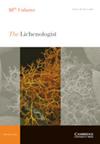在德国城市环境中,变革性的生物多样性教育对于感知、欣赏和支持地衣多样性的重要性
IF 1.4
4区 生物学
Q4 MYCOLOGY
引用次数: 0
摘要
在德国,城市绿地对于保护生物多样性是不可或缺的。此外,绿地的可用性通常为市民提供了体验自然的唯一机会。地衣在物种多样性、生态系统功能和服务方面都是城市环境的重要组成部分。然而,它们很少成为生物多样性教育的主题。为了加强对其多样性的认识和欣赏,有必要在正式和非正式部门开展变革性的生物多样性教育。这种变革性的生物多样性教育不仅应该提供关于物种和栖息地的知识,还应该提供关于生物多样性的所有方面的知识,即生物多样性的三个层次、生物多样性丧失的驱动因素和生态系统服务。因此,生物多样性教育的设计对教育工作者和教师来说可能特别具有挑战性。本文展示了如何根据变革性教育、支持自然体验、知识转移(广义的物种知识和跨学科方面的知识)、参与和合作以及数字媒体的使用等原则,开发城市地衣生物多样性教育项目。在德国测试的两个最佳案例项目,作为在城市地区设计和实施变革性地衣教育的例子。类似的方法可以很容易地应用于超越国界的其他教育系统。本文章由计算机程序翻译,如有差异,请以英文原文为准。
The importance of a transformative biodiversity education for perceiving, appreciating and supporting lichen diversity in German urban environments
Abstract Urban green spaces are indispensable for the conservation of biodiversity in Germany. In addition, the availability of green areas often provides citizens with the only opportunity to experience nature. Lichens are an important component of urban environments in terms of both species diversity, and ecosystem functions and services. However, they are rarely the subject of biodiversity education. To bolster awareness on their diversity and appreciation, a transformative biodiversity education in both the formal and informal sectors is necessary. This transformative biodiversity education should not only provide knowledge about species and habitats, but also on all dimensions of biodiversity, viz., the three levels of biodiversity, drivers of biodiversity loss, and ecosystem services. For this reason, the design of biodiversity education may be particularly challenging for educators and teachers. This paper shows how biodiversity education projects on urban lichens can be developed in accordance with the principles of transformative education, supporting nature experience, knowledge transfer (species knowledge in a broad sense and interdisciplinary aspects), participation and cooperation, as well as the use of digital media. Two best-case projects, tested in Germany, are presented as examples for the design and implementation of a transformative lichen education in urban areas. A similar approach can be easily applied in other education systems beyond national boundaries.
求助全文
通过发布文献求助,成功后即可免费获取论文全文。
去求助
来源期刊

Lichenologist
生物-真菌学
CiteScore
2.90
自引率
14.30%
发文量
23
审稿时长
6.0 months
期刊介绍:
The Lichenologist is the premier scientific journal devoted exclusively to the study of lichens worldwide. As the leading forum for the dissemination of new concepts and topical reviews, The Lichenologist reaches more scientists concerned with the study of lichens and lichen symbionts than any other single journal. All aspects of lichenology are considered including systematics and phylogenetics; molecular biology; ultrastructure, anatomy and morphology; secondary chemistry, effects of pollutants and use as bioindicators; biogeography. In addition to standard length research papers, the journal also publishes Short Communications and Book Reviews. A monthly issue may occasionally be devoted to papers deriving from a symposium.
 求助内容:
求助内容: 应助结果提醒方式:
应助结果提醒方式:


